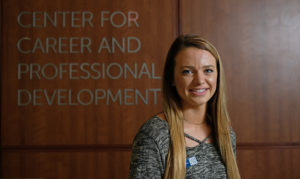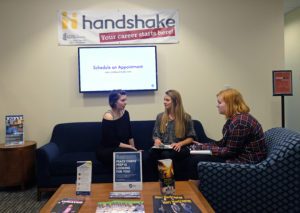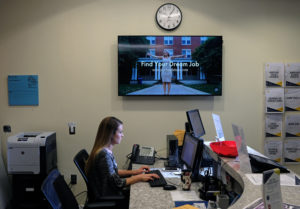The crash was the worst part. The rain. The speeding truck. The loss of control. Her friend, unconscious in the passenger seat.
Jennifer Monroe ’18 was grateful to be alive – grateful that her friend had survived thanks, in part, to her quick actions that early morning in October. But a sharp pain in Monroe’s head had sent her back to the emergency room days later, where a doctor’s words seemed almost as bad as the accident.

She had a traumatic concussion, he told her. She should consider withdrawing from school to focus on healing.
The first-generation college student was less than a year from graduation. She took five classes and worked two jobs and filled her free time with internships and activities because she believed it would pay off in the end.
To stop now, even temporarily, would be to delay all she’d worked so hard for. Monroe sat in the hospital bed and cried. Then she made a decision.
Finding her place
Monroe loved UMW the moment she set foot on campus. She arrived as a sophomore, in search of a place that felt more like home than the sprawling New England university she’d attended right out of high school.
There, she said, “I was sitting in classes with 200 people. I didn’t feel comfortable raising my hand or asking questions.”
UMW was a 10-hour drive from Monroe’s hometown in Massachusetts. But she knew this was where she belonged. This was where she could find her voice, where she could carve out a place for herself and make a difference.
She majored in business administration and minored in sports management. She filled her calendar with events and volunteer opportunities, determined to make the most of her college career. She became a peer consultant at the university’s career center, worked as a marketing intern for the Women’s Leadership Colloquium and served with the Marketing Club and Student Alumni Ambassadors.
She “integrated herself well into a variety of College of Business activities,” said Lynne Richardson, vice president for administration and finance.
In the classroom, she was a model student, said Kimberly Gower, a business professor. “She’s what I call the full package. She has all the hard skills and the soft skills students need to succeed when they get out of college and get a professional position.”

The professors knew her name. They knew when she didn’t come to class. Monroe understood right away how special this was. But she couldn’t have imagined how important it would be.
A crash – and a resolution
She was taking her friend to the airport. It was practically the middle of the night when they hit the road for the 6 a.m. flight out of Richmond.
Monroe crept cautiously along the interstate in heavy rain. But she was powerless against the wall of water thrown by an 18-wheeler that flew past her. The car hydroplaned, coming to a mangled rest in a ditch.
Her friend was seriously injured. Monroe’s wounds were less visible: Bruised ribs, a concussion. There was no treatment other than rest and restricting activity – neither of which Monroe was very good at.
Until that moment, she’d lived her life out of a planner. But there had been no way to plan for this.
Monroe gathered herself in her hospital room. Withdrawing from school was not option. Neither was finishing her coursework over winter break. Not even after missing three weeks of classes.
“I was not going to accept an incomplete,” she said, even as Gower and others urged her to.
Day after day, night after night, Monroe, ice pack pressed against her head, worked to catch up.

She felt the support from everywhere: Classmates and coworkers, professors and deans, friends and supervisors. They brought her lunch, drove her to the pharmacy, delivered her favorite candy.
When Gower learned Monroe was driving back and forth to Richmond to visit her friend in the hospital, the professor offered to put her up in a guestroom at her home nearby.
“This is when I knew UMW was my home away from home,” Monroe said.
This is how she found the strength to finish what she’d set out to do. End the semester along with everybody else. Make the Dean’s List.
Already she is living the lessons she’d learned in the classroom: The importance of making connections and taking risks and overcoming fears. Of accepting challenges and change both planned and unplanned.
This was how she knows she’ll be ready for whatever meets her on the road ahead.